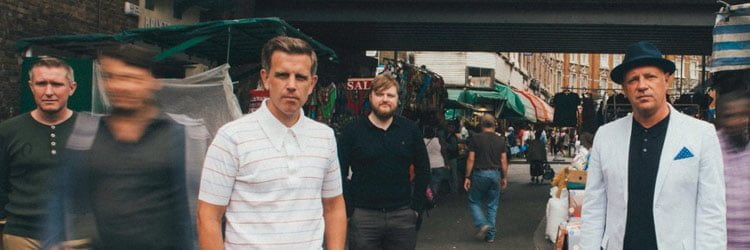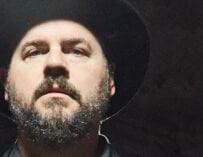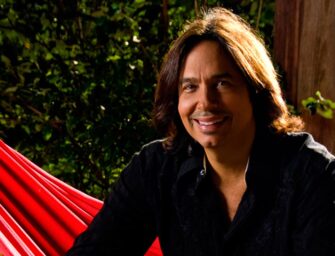
Neil Jones [left]: “That little bit of magic dust that rubs off from people like Paul is worth its weight in gold”
We chat to the Midlands singer and songwriter about working with Paul Weller on the mod-influenced band’s soulful new album
With the music industry doing its best to insist that this life is only for the young, we’ve always got a lot of respect for those bands that take the long route; slowly honing their craft, refusing to give up on their dream and continuing to reward the fans that have been there from the start (though we draw the line at Bradley Walsh). Such is the case with Stone Foundation, the soulful mod-influenced band whose dogged determination and blossoming talent sees them about to release their best and most-hyped album over a decade into their career.
That Paul Weller saw enough in them to agree to produce and perform on Street Rituals tells you all you need to know. It’s nothing less than they deserve and is testament to the writing partnership of the band’s two Neils, Jones and Sheasby. The Midlands songwriters have worked with Weller to create an album with a strong social message that oozes soul. Ahead of its release, we caught up with Neil Jones to discuss working with The Modfather and the steady rise of Stone Foundation…
Street Rituals struck us a really soulful album…
“That was the main influence. We wanted to do something that had that early 70s, Marvin Gaye/Curtis Mayfield vibe to it. One of my favourite albums is Syl Johnson’s Is it Because I’m Black? and we were listening to a lot of those kind of records and we wanted to tell that kind of social commentary within what we were writing.”
How does your writing partnership with Neil Sheasby work?
“I tend to write in a more sort of standard way with my guitar. Neil has his Dictaphone and he’ll just send me over bits and pieces and I’ve just got to try and look at those and embellish them. A lot of the stuff I write tends to be start-to-finish songs and then Neil will come up with an idea for a beginning or a mid-section. We have different ways of working to be honest, some of the songs on this record we’ve sat in the studio with the other guys in the band and they’ve been shaped around what sort of things we’ve been playing at the time.”
Do you each have specific strengths?
“I’ve always been intrigued and interested the most by melodies and hooks, like those great old soul records that have these great hooks that just drag you in. Neil is more of the type of guy who will sit down and write lots of stuff out first. There are definite strengths to both of our games but in general whatever works the best works the best and that’s what we use.”
Do you find the songs change a lot once you’re in the studio?
“Totally, take something like Back In The Game. I brought a whole song to the table, we started working on it and then Neil came up with the little intro part that sounds quite like The Impressions. We first worked on that song with the conga player on the kit. When our normal drummer came back in for the second session he added a totally different element to it, which took it in another direction again.
“We demoed all the songs and kept Paul [Weller] in the loop with everything, so he was privy to what was going on our end and was sending me sheets with suggestions for time changes or feel changes or the odd lyrical change. By the time we got to Black Barn it was really cool, because we’d worked through the songs and kept Paul in the loop, we were able to make really quick changes. So, if someone shouted ‘this section’s not working’ we’d just try for a slightly different feel and we’d just work with it on the spot.”

Jones: “You’re told that if you don’t make it by the time you’re mid-20s you might as well knock it on the head”
How did that relationship with Paul Weller come about?
“Funnily enough it was through a songwriting basis. Through a mutual friend he’d heard A Life Unlimited, the last record we made and he loved what he heard. I had a really bizarre call at the end of 2016, basically saying ‘I love the record, I’m working on this song at the moment, would you guys like to have a look at it?’ He’d arranged most of the chord structure and the actual backing of the song and wanted us to come up with some lyrics and look at the chorus. He sent us the demo and we had a play around with it in our studio. We gave it the SF treatment with the brass section and ended up with The Limit Of A Man.”
And that led to him inviting you down to his studio to record an album?
“Yeah, simple as that. We sent him the demo, he loved it and said ‘look, do you fancy coming to the studio with the boys and jamming?’ There were no preconceptions that this was going to be a new record. Neil and I always have lots of ideas on the backburner with regards material but we just went with the thought, ‘we’ve got some rough ideas let’s not waste this opportunity.’ We turned up and started playing through some stuff with Paul and by the end of the day I think we had five or six songs on the desk and he looked at us and said ‘lads I think you’ve got the makings of a record here.’ The relationship with him blossomed from there. I think he enjoyed the fact that he got to sing with a band again, there was no direct pressure on him and he could just enjoy being a musician with five other guys.”
Had he been a big influence on you previously?
“Oh yeah, massively. It’s really weird because there are three of us in the band who probably wouldn’t play music if it wasn’t for Paul. Whether The Jam, The Style Council or his solo career, he’s influenced us along the way. He’s the guy I looked up to as a kid, not just the way he performs but the songs and his style, everything really. I got wrapped up in that mod culture as a kid, he’s a massive influence.”
Did you have to pinch yourself when you were jamming with him in the studio?
“For the first ten minutes I was getting the odd nudge from the guy next to me saying ‘that’s fucking Paul Weller,’ but after that stopped he’s just a mate now. He’s a really good geezer and his work ethic is very similar to ours, he doesn’t muck about in the studio. He just wants to get on with things. The buck usually stops with me or Neil and we say what we think works and what doesn’t, but this time we had this outside influence and you can’t pick a bigger songwriter to tell you what’s working and what isn’t.
“LIKE ANYTHING…IF YOU DO IT OFTEN YOU BECOME BETTER AT IT”
“Having him in the producer’s chair was just like having a weight lifted off of you, so you could just concentrate on doing the best work you could. They say never meet your heroes but I’m really glad I got to work with Paul. That little bit of magic dust that rubs off from people like Paul is worth its weight in gold.”
What specific things did he bring out of you as songwriters?
“I remember the first time I sent him the demo for Your Balloon Is Rising, which funnily enough was a really old song that me and Neil had. We had the chorus from a few years back but I couldn’t remember any of the verse or bridges of the song and I remember myself and Paul sending Dictaphone messages back and forth to each other. The fact that he’s playing on an acoustic guitar in his living room somewhere and he’s sending me these little takes makes you think ‘this is Paul Weller so I’m going to try more than ever to make sure that this song is absolutely right.’ I had an inclination that I wanted him to sing the song, so with that in mind it just pushes you even more to make the song as perfect as humanly possible.”
This additional level of interest continues your slightly different career arc, how do you feel about that?
“It’s weird. It’s everything you’re told but in reverse. When you first start out in music you’re told that if you don’t make it by the time you’re mid-20s you might as well knock it on the head and get a normal job. I think that’s a load of bullshit to be honest. Look at someone like Seasick Steve, or Gregory Porter who’s a massive inspiration. They’re not really spring chickens but music is so universal that a good song is a good song, whether it’s written by an 80 year old or a kid who is 18. We’re really fortunate to have a strong and loyal fan base that’s always been there, it just gets a little bit bigger each time. It’s a really exciting time to be part of this band and writing music.”
Do you think that your writing has improved album upon album?
“Definitely, I think it’s like anything, if you do something a lot and if you do it often you become better at it. Just playing the guitar, the more you do it the better you’re going to get and that’s definitely been the case with us. Having the two of us writing the bulk of the songs for the band is a bonus because we push each other every time and there’s a friendly rivalry with how we write. Someone will come up with something really great and the other person will have to lift their game again. I think it’s really useful having the two of us like that.”
Will you agree on the theme of the album together or is it more organic than that?
“We made a definite plan to try and write a record with a social element to it. I’ve just moved to the edge of Coventry I’ve been hanging around an area called Ball Hill which is a very multicultural and diverse place. There’s a great vibe there whether from Eastern European or Jamaica or Turkey. It’s a melting-pot and you only have to walk down that street to get vibed-up and get ideas flowing.
“We also play a lot in London, it’s like a second home to us really. The album cover was shot on the corner of Electric Avenue in Brixton which is a wonderful place to hang out in. Whenever I play records like Back To The World by Curtis Mayfield or What’s Going On? by Marvin Gaye they always give me a sense of walking through a city street so that you feel completely immersed in the place that you’re in. That was always the thing in the front of my mind, we wanted to make someone feel like they’re on a journey through this winding city.”
Are their specific events that have happened to you which inspired the tracks?
“Everything on the record has been influenced by the things that happen around us. Something like Back In The Game, I wrote that tune after a conversation with Paul on the phone. We were talking about the state of affairs in the world and that kind of feeling when you wake up in the morning and you think ‘okay I’ve got to face another day now.’ You’ve got to try and change your own little world around you and then hopefully it will have an effect on the people outside of your small circle of friends as well. Love Rediscovered, I know a lot of people who are religious and it was a song we devised to say if there is a god in this world then don’t you think he should be trying to help us out a little bit here, because we’re in a bit of trouble.
“Certain songs address certain issues, but nothing too specific. We wanted to keep it quite open really so people could take what they wanted from it. I’m pretty certain that if I was to walk down any city street in the UK I’d pretty much see a similar scene to the one I see in Coventry where there’s shit loads of homeless people in the street and little bits of tension in the air. People need to leave that and start pulling together.”
Finally, can music can bring hope and change to the world?
“I definitely think so. It helps to lift moods and if we could have anything for this record we just hope it makes people think a little bit. When we’d finished and I sat back and listened to it I thought about what we were talking about, and looking back at those old soul records, and I thought ‘fucking hell we’re making the same mistakes over and over again.’ Surely at some point people have got to want change and want to do something about the status quo and the predicaments that we seem to find ourselves in. We’re living in a world where everyone seems hell-bent on retreating into their little castles. It all starts with communities really and that’s sort of the message of this record. If people start to pull together as communities then it’s a small step in the right direction.”
Interview: Duncan Haskell
Street Rituals is released 31 March and Stone Foundation will shortly be heading out on tour – full details here: stonefoundation.co.uk



































Related Articles